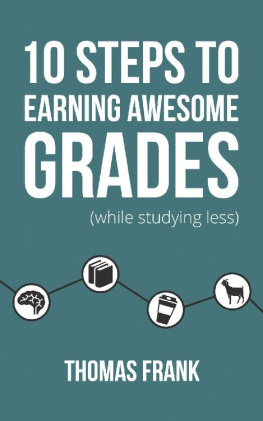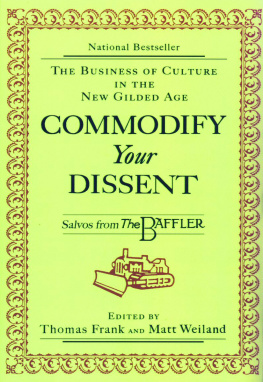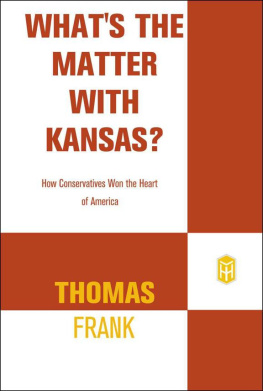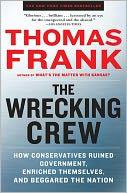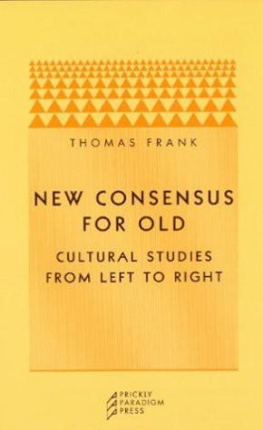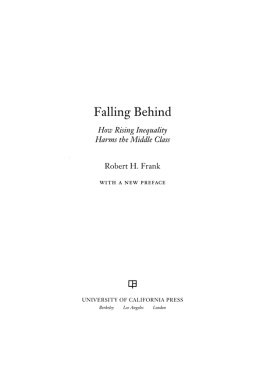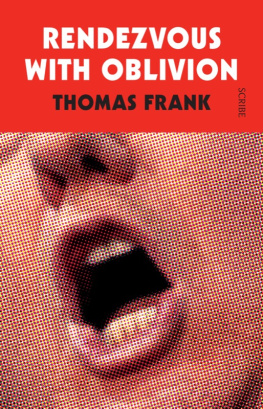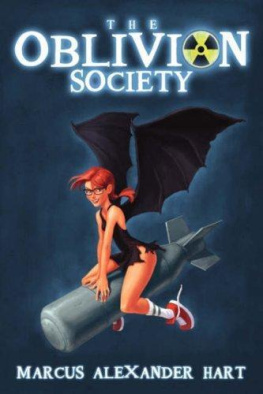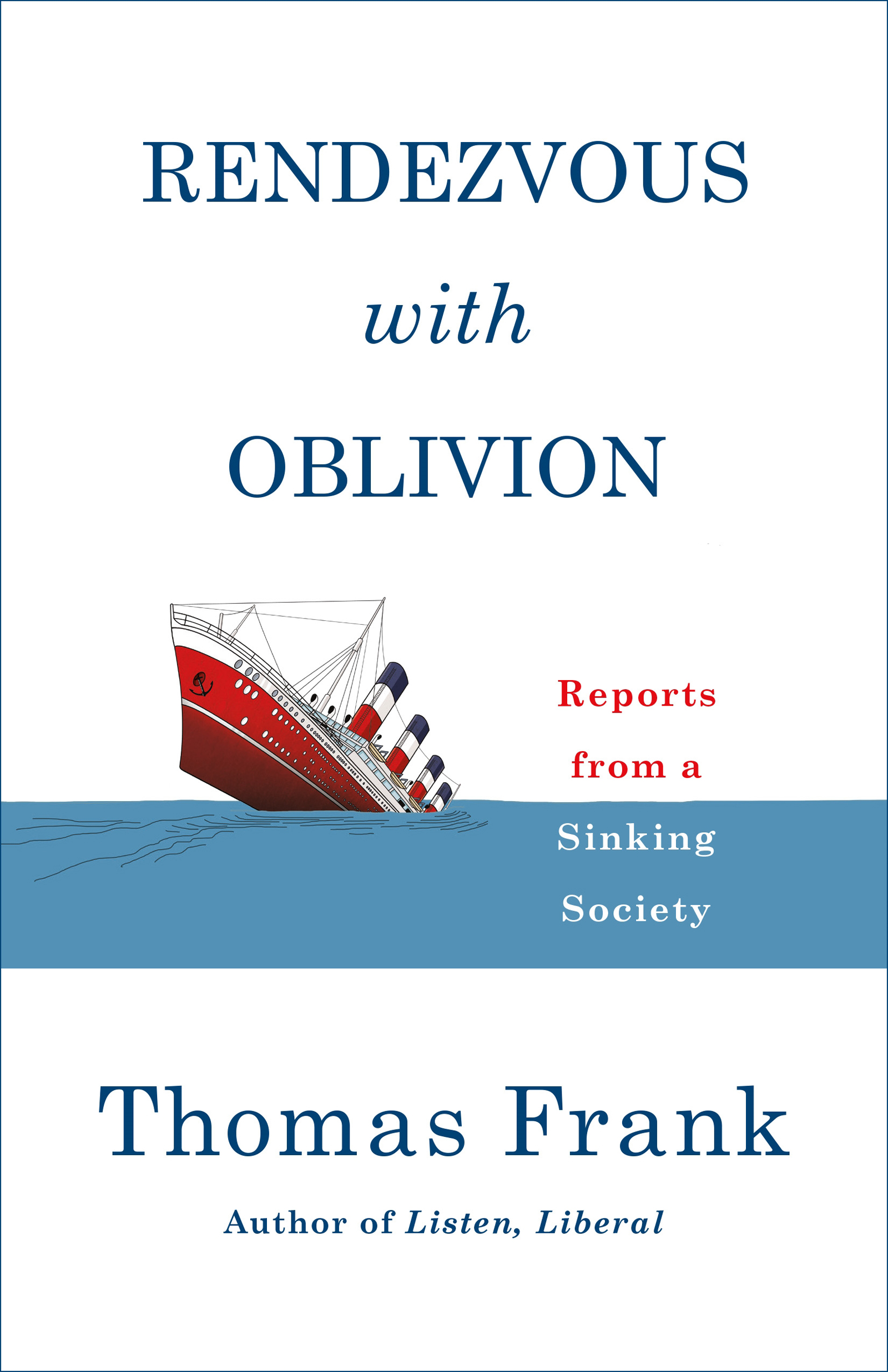Contents
Guide
Pagebreaks of the print version

The author and publisher have provided this e-book to you for your personal use only. You may not make this e-book publicly available in any way. Copyright infringement is against the law. If you believe the copy of this e-book you are reading infringes on the authors copyright, please notify the publisher at: us.macmillanusa.com/piracy.
The essays collected here scan over many diverse aspects of American life, but they all aim to tell one essential story: This is what a society looks like when the glue that holds it together starts to dissolve. This is the way ordinary citizens react when they learn the structure beneath them is crumbling. This is the thrill that pulses through the veins of the well-to-do when they discover there is no longer any limit on their power to accumulate.
In headline terms, these essays cover the years of the Barack Obama presidency and the populist explosion that marked its end. It was a time when liberal hopes were sinking and the newly invigorated right was proceeding from triumph to triumph. When I wrote the earliest installment in the collection, Democrats still technically controlled both houses of Congress in addition to the presidency; when I finished these essays, Donald Trump sat in the Oval Office and Republicans had assumed a position of almost unprecedented power over the nations political system.
For a few, these were times of great personal satisfaction. The effects of what was called the Great Recession were receding, and affluence had returned to smile once again on the tasteful and the fortunate. The lucky ones resumed their fascinating inquiries into the art of the cocktail and the science of the grandiose suburban home. For them, things transpired reassuringly as before.
But for the many, this was a period when reassurance was in short supply. Ordinary Americans began to understand that, recovery or not, things would probably never be the same in their town or neighborhood. For them, this was a time of cascading collapse, with one trusted institution after another visibly deteriorating.
It was a golden age of corruption. By this I do not mean that our top political leaders were on the takethey werentbut rather that Americas guardian class had been subverted or put to sleep. Human intellect no longer served the interests of the public; it served moneyor else it ceased to serve at all. That was the theme of the era, whether the locale was Washington, D.C., or the college your kids attended, or the city desk of your rapidly shrinking local newspaper. No one was watching out for the interests of the people, and increasingly the people could see that this was the case.
The financial crisis of 2008 engraved this pattern in the public mind. Every trusted professional group touching the mortgage industry had turned out to be corrupt: real estate appraisers had puffed the housing bubble, credit rating agencies had puffed Wall Streets trashy securities, and of course investment bankers themselves had created the financial instruments that were designed to destroy their clients. And then, as the larger economy spiraled earthward as millions around the world lost jobs and homes the trusted professionals of the federal government stepped in to ensure that their brother professionals on Wall Street would suffer no ill effects. For the present generation, the bailout of the crooks would stand as the ultimate demonstration of the worthlessness of institutions, the nightmare knowledge that lurked behind every scam that was to come.
What I describe in this volume is a vast panorama of such scamsa republic of rip-offs. Bernie Sanders, the archetypal reform figure of our time, likes to say that the business model of Wall Street is fraud, but in truth we could say that about many of the designated protectors of our health and well-being. Pharmaceutical companies, we learned, jack up prices for no reason other than because they can, because it is their federally guaranteed right to do so. The brain power of Silicon Valley, meanwhile, concentrates on the search for ingenious ways to harvest private information and build monopolies so that it, too, can gouge the world with impunity.
The university is the ultimate source of credentialed expertiseof the idea that there are values beyond those of the marketand here, too, the rot and the corruption were unmistakable. That the traditional professoriate was doomed became obvious in these years, and also that the contemplative way of life was circling the drain as well. But even as the intellectuals went down, the universities themselves prospered in a remarkable and even unprecedented way, growing and building and driving tuition prices skyward. As these developments unfolded, legitimate higher ed was dogged by countless educational scams and even fake-educational scams, operations that would sell anyone a realistic-looking college degree for a modest sum.
In politics, of course, the scam and the fib are as old as the earth itself. Even so, the past decade has been a time of extraordinary innovation in the field. The rise of the super PAC and the Citizens United decision drew the most attention in this regard, but what seems most striking in retrospect was the way the casual dishonesty of politics started to spill over into everyday life.
The consolations of ideology became available to the millions, thanks to Facebook and Twitter and the political entertainers on cable news. Millions of Americans came to believe that everything was political and that therefore everything was faked; that everyone was a false accuser so why not accuse people falsely; that any complaint or objection could ultimately be confounded by some clever meme; that they or their TV heroes had discovered the made-up argument by which they could drown out that still small voice of reality. At right-wing rallies, one began to notice a gleeful denial of things that were obviously true.
Legitimate public defenders like newspapers were simply shutting down. And as your local paper went silent, the reign of factuality seemed to crumble as well. Among newspapers that survived, meanwhile, the resident professionals often seemed to be in denial about what was happening. This was a golden age of journalism, they chanted, and as their little world shrank and the public grew to hate them more and more, the survivors came together in an ever tighter circle of professional unanimity, missing the obvious but agreeing with one another on the correct interpretation of an amazing variety of events.
Fake news flourished, of course. For every newspaper that withered away, an opportunity opened up for somebody willing to imitate what had gone before. Social media entrepreneurs prospered, as did home-grown propagandists and online scam artists. It sometimes seemed as if everyone was search-engine-optimizing something or making bogus documentaries or Photoshopping some outrageous text onto some stock photo. The Internet teemed with collators of tweets, makers of memes, content farms, traffickers in panic and stereotype, liars for hire.
The representative figure of this new era was Andrew Breitbart, the master of a homemade right-wing Web empire, who rose from obscurity to become the bellowing scourge of the mainstream media: accusing promiscuously, denying vociferously, always shouting, always rationalizing. For him, representation was everything, reality was nothing, and politics became more and more an analogue of pro wrestling. The pseudo-event was the only game in town.


